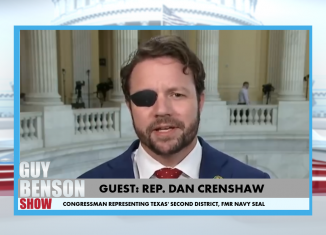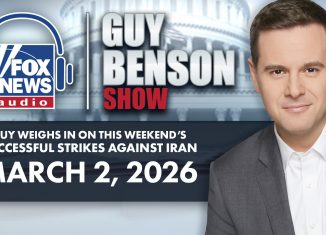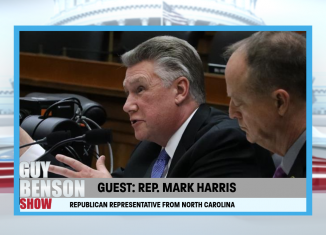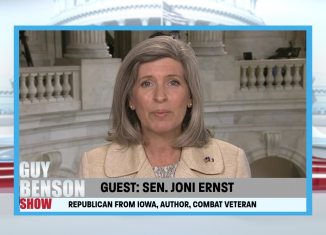“Yes” Robert O’Brien, National Security Advisor Believes That More Arab States Will Join The Abraham Accords
Robert O’Brien, National Security Advisor spoke with Fox News Radio’s Guy Benson about the historic signing of the Abraham Accords at the White House this week. Ambassador O’Brien when asked about the possibility of more Arab States joining the Abraham Accords replied “yes.”
Listen To The Full Interview Below:
Full Transcript:
GUY BENSON, FOX RADIO HOST: Joined now by Ambassador Robert O’Brien, the national security advisor of the United States of America. Mr. Ambassador, great to talk to you again.
ROBERT O’BRIEN, U.S. NATIONAL SECURITY ADVISOR: Great to be on your show, Guy. How are you doing today?
BENSON: I’m doing well. It’s always good when it’s a Friday, at least it’s a little bit more upbeat here, I think, for a lot of people. Weekend just around the corner, but a lot of very serious stuff happening in the country and around the world. Mr. Ambassador, last time you and I spoke we were on Air Force II flying back from France together on that trip, and we talked about, among other things, TikTok and that national security challenge that that app and a few others like WeChat present because of Chinese espionage efforts. There’s a flurry of action on that front now, reports that the Trump administration is going to ban downloads of apps like TikTok and WeChat soon. Can you shed some light on what the decision is, what it means, and what that process looked like?
O’BRIEN: Sure, the president signed an executive order on both of these apps, WeChat and TikTok, and we’re looking at others. The Indians have already banned 150 Chinese apps, because the Chinese Communist Party has been – they use those national security laws to obtain data from folks all over the world, just like they do at home in China where they have a total surveillance society. They’re using these apps like TikTok around the world to gain tremendous insight into the American people and into our private personal data. And so the president said we’re not going to do that anymore. There has been some activity regarding TikTok about whether it would sell or reconstitute itself as an American company, comply with U.S. laws, protect American data here. We’ll have to see how that works out. I think those talks are ongoing, but I think we’re taking a very careful look at Chinese technology, whether it’s Huawei, the telecom front, or TikTok or WeChat on the app front, because we want to make sure that the American people are protected from the Chinese Communist Party.
BENSON: So if nothing else changes, what is the actual action that the Trump administration has taken here, and when does that come into effect? And does that mean TikTok is now gone off of people’s devices, or is it just a ban on new downloads? I’m just trying to get a little clarity there.
O’BRIEN: Yeah, I think that’s something the Commerce Department and the Treasury Department are working out, but it would certainly – new downloads of TikTok would be banned, and updates would be banned. So whether it would be possible to remove TikTok from folks’ phones and computers is — that’s unclear. But certainly new transactions with TikTok would be banned if they’re not able to comply with U.S. laws and regulations.
BENSON: OK. So you made reference to briefly these discussions about a possible acquisition within the United States. The company there is Oracle, people have been talking about a potential deal there. There have been some reports, Mr. Ambassador, that people within the administration have been split. There are reports at least suggesting that the secretary of state, Mike Pompeo, the attorney general, Bill Barr, being skeptical of how that deal could look in terms of national security, was it good enough? Apparently the Treasury secretary, Steve Mnuchin, was satisfied with it. I don’t know how much you can get into some of the internal deliberations, so let me – if you want to comment on that, feel free. I’ll ask you this though, if there were to be a company like Oracle, or any other American company that was going to buy TikTok and would make this a satisfactory approach from the administration’s perspective, what are you guys looking for? What are the benchmarks that would need to be achieved in any such deal that would make someone like you feel comfortable that this was now no longer a threat from China?
O’BRIEN: Yeah, we’ll have to see what happens and what the ultimate deal – if there is a deal — looks like. But the benchmark is that American’s data must be protected. And we’ve — just have, unfortunately, a very, very sad history of the Chinese Communist Party hacking everything from Marriott Hotels, you know, obtaining the personal information on 150 million Americans including their passport numbers, hacking a number of our healthcare organizations to get health records of Americans, hacking the Office of Personnel Management to obtain personal information on employees of the U.S. government. And so the Chinese do this routinely within China, and they develop entire profiles on every citizen in China, and then they assign them a social credit score which determines whether they can buy plane tickets, or get a job, or be issued a passport. And we think the Chinese may be trying to do that to Americans as well, but at a minimum, assembling dossiers on every single person in American and in other countries. There have been extensive reports over the past week or two about Chinese activities along these lines in both the U.K. and Australia. So it’s a real concern. And so when we look at any purchase, or if we look any app that’s Chinese Communist Party related or a state owned enterprise or a Chinese company, what we have, the loadstar (ph) is, how do we protect the American people and how do we protect their data?
BENSON: Yes. And some of those activities that you just mentioned, the social credit scores, it’s Orwellian, it’s chilling, and I think those concerns are absolutely well founded. I do want to ask you, one of the top producers in Hollywood, Judd Apatow — who probably disagrees with you and the Trump administration on most things — Judd Apatow came out this week and was critical of the Hollywood smart set (ph) really, all of — a lot of people at least within his industry, Disney in particular, I think in the crosshairs, saying that a lot of American companies and in Hollywood are so addicted to Chinese money, that they’re willing to basically surrender American values and Western values. One example that cropped up recently was this remake of the movie “Mulan,” the live action version of this film. In the credits, Disney actually thanked the Communist Part of China, thanked some of these local officials that, according to the Trump administration, are directly linked to the concentration camps that are abusing Uyghurs and ethnic minorities, religious minorities, in Xinjiang and elsewhere. What’s your reaction when you see a major American, prestige company like Disney thanking the Chinese Communist Party sort of, for the, oh, it’s so generous of them to let them film a movie like “Mulan” in the province where we know these concentration camps are being operated?
O’BRIEN: Well look, we saw the same thing, Guy, in the 1930s with the way the Hollywood appeased the Germans right? And how they altered films to make sure they were acceptable to the German market, which was a big market for the studios from the 30’s. We’re seeing that now, and it’s not just Disney, in thanking the public security folks in Xinjiang that are putting and Uyghurs and reeducation camps and forcibly sterilizing them and putting hoods over their head and putting them in railcars and transporting them around, forcing their kids into state orphanages. I mean, it’s a tragic thing that’s happening in Western China, and in the Xinjiang province, and it’s heartbreaking to see any sort of reference to them. But look, it goes beyond the “Mulan” situation. This happened — if you — when we see the “Top Gun” sequel, which I’m look forward to — as is most of us are — the patches on the back of Tom Cruise’s Maverick’s flight jacket are going to be changed so that Japan and Taiwan patches are removed from the first film, and then – and (ph) put patches on that are acceptable to the Chinese Communist Party. We saw this situation with the Houston Rockets and the NBA, kowtowing to China like we’ve never seen before. So the reach of the Chinese Communist Party — it’s one thing for them to suppress speech within China, to control speech and control people within China, but because of their economic influence and power, and because of what we’ve allowed them to do overtime, that reach is now coming right into America, right into Hollywood, right into the NBA. And the Chinese have no say in — when it comes to ordering the American companies around. And that’s something every American should be concerned about. The president certainly is, and that’s why he’s taken such strong action against China during his first term.
BENSON: Mr. Ambassador yesterday, in a CNN town hall, Joe Biden was asked about China and also about Russia. He referred to Russia as an opponent. He would not use that term to describe China. Instead, he said they’re a very serious competitor for the United States. Last year, though, he was asked about that, he laughed off the notion that China was even a competitor. He’s like, come on man, they’re not a — they’re not competition for us. They are good folks over there. I’m not going to ask you to weigh in on the presidential race or some of the presidential rhetoric, but when you look at the Communist Party of China, you look at that regime, and you start thinking about words like enemy versus opponent versus competition, where do you come down?
O’BRIEN: Well, all I can do is watch what the Chinese are doing and what the Chinese Communist Party is doing. So they’ve tried to annex a huge swath of the Pacific Ocean, through which — most of the world commerce travels through the South China Sea. And China’s attempted to annex the entire South China Sea from — with no legal basis, no international legal basis, just on the grounds that they’re a big country and the other countries around them are small, so they ought to be able to gobble up international waters wherever they see fit. I’ve — you watch them now attacking Indian patrols on the line of actual control in the Himalayas on the border between China and India. You’ve seen them snuff out the light of democracy in Hong Kong, and they are arresting — I think over the weekend, they arrested 300 democracy activists in Hong Kong, breaking their sacred treaty obligations to the British in the Sino-British declaration, which turned Hong Kong back over to the Chinese, and the Chinese promised one country but two systems. And we’re now one country, one system.
BENSON: Right, they lied.
O’BRIEN: And you see terrible bullying — you see terrible bullying of Taiwan. So all I can do is judge the Chinese by their actions. And then watch the way they’ve treated the United States. We’ve watched how they handled the COVID virus, where they were — gave out no information, didn’t allow international doctors onto the scene, banned travel within China from Wuhan but allowed residents of Wuhan and Hubei province to travel all over the world and spread the disease.
So it’s a very, very nasty situation that’s going on right now. The Chinese are being incredibly aggressive and –
BENSON: Right, but would you –
O’BRIEN: So I’m just judging by their actions. And I think what the president wants to do, and what those of us in the administration want to do, is take every step necessary to protect the American people.
BENSON: Would you refer to or describe or characterize those actions that you just ran through as those of an opponent of the United States, of an enemy of the United States?
O’BRIEN: Well, they do seem pretty adversarial, and they seem pretty aggressive, but not just to the United States, but to countries all over the world. You look at what they’ve done to India and how they’re treating the smaller countries, the (inaudible) countries and the — with respect to the South China Sea, you see what they’re doing to Taiwan. So look, it’s an extraordinarily concerning situation. That’s why the president is — has taken tough action with the Chinese, and that’s why we’re doing anything we can to protect the American people, whether it’s protect our telecommunications, protect our data, or the president take a very Ronald Reagan approach to defense with (ph) a peace restraint and rebuilding our military. So, we’re doing everything we need to, to make sure that whatever the Chinese decide to do, they understand that they’re not going to change the — our way of life, and they’re not going to cow or — they’re not going to cow or bully the United States.
BENSON: Speaking of peace through strength, a huge breakthrough this week. Some extraordinary news, so we flash back to the beginning of this administration. The president deciding to actually follow through on the promise of moving the U.S. embassy to Jerusalem in Israel. People had promised that for years, it had been voted for by Congress — bipartisan support, but then when he moved to actually do it, people completely flipped out. Former Secretary of State John Kerry, on the record, saying it will be an explosion in the Arab world — which is sort of interesting to see juxtapose with this week, right? We were also told, oh, if you’re going to go and kill Soleimani — which is what the Trump administration did in Iraq, a top terrorist leader who has lots of American blood on his hands — that was gong to lead to an all out war, we were told, in the Middle East. John Kerry also back in 2016, in the outgoing days of the Obama administration, said there is literally no chance for any normalization, any separate peace within the Arab world and Israel without resolving the Palestinian question. And then at the White House what did we see this week? Bahrain, UAE, and Israel sitting at the table. Two of the four all time peace deals between Arab states and Israel signed in one day. Just an extraordinary achievement. Your reaction to that and the work that went into that, and then maybe your response to some of the critics who say, actually it’s really not that big of a deal — we’ve heard this from some Obama alums — it’s not that big of a deal, they were sort of friends already, they weren’t at war. Your reaction to a lot of what I just put on the table?
O’BRIEN: Well it’s interesting – John Kerry has not had a good – a good record on predictions in foreign policy for a long time. And other than the (inaudible), I think he had probably the worst week and – as a result of the successes of the Trump administration, of President Trump personally and his really extraordinary diplomacy. And I’m (ph) — not just in the Middle East but in the Balkans (ph) as well. As far as the Obama administration, I saw one statement from vice – former Vice President Biden, who suggested that the peace deals were the result of eight years of work during the Obama/Biden administration. I found that humorous. So, look, what you’ve got here — and I think we need to focus a little on – a very historic week. And that historic week was brought around – brought about first by the courage of Mohammed bin Zayed, the crown prince of the UAE, King Hamad in Bahrain, and Bibi Netanyahu the prime minister of Israel. They all showed tremendous courage. They will go down — and their legacies will be that of peacemakers — and they’ll go down in the same breath of Anwar Sadat and King Hussein and Perez and Begin and Rabin. Several of those folks paid for their desire to make peace with their lives.
BENSON: Right.
O’BRIEN: And so these were more extraordinarily courageous, and we give them significant credit for what they’ve done. But it was orchestrated and facilitated by Donald Trump. And President Trump came into office, everyone knew he was a dealmaker, he’s written “The Art of the Deal”. He was known in business as a great dealmaker. What I’ve said is, that he’ll leave office and his legacy will be that of having been a peacemaker. And what he did in building creditability and entering political capital by moving the embassy to Jerusalem, by recognizing the Golan Heights in Israel by restoring our relationship which had been utterly frayed and destroyed under the Obama/Biden administration. The total lack of trust at the time that they came to office, I mean, there was a report that President Obama and Vice President Biden kept Bibi Netanyahu waiting for eight hours for a meeting in the White House cooling his heels in a reception room. That was – that relationship was in desperate need of repair –
(CROSSTALK)
BENSON: — a totally different 180 under the Trump administration. We only have about 30 seconds left, Mr. Ambassador. Just very quickly –
O’BRIEN: No and he built capital with the Gulf Arab states by pulling of the JCPOA and confronting Iran. He then did something most politicians won’t do. He spent the political capital he gained, and he spent it on peace. And as a result we have this great – great Abraham Accords and we made history at the White House. It’s something I think historians – the media may not report on it, historians will look back at this as an extraordinary week for President Trump, for America and for the countries that may peace in the Middle East.
BENSON: Very quickly, yes or no, do you think that more Arab states might join the Abraham Accords?
O’BRIEN: Yes.
BENSON: We have to leave it there. Intriguing, I’d love to dig into that with you next time. Robert O’Brien – Ambassador Robert O’Brien, the national security adviser of the United States of America. Mr. Ambassador, have a great weekend, thanks for your time.
O’BRIEN: You too, great to be with you.
BENSON: We’ll be right back.







